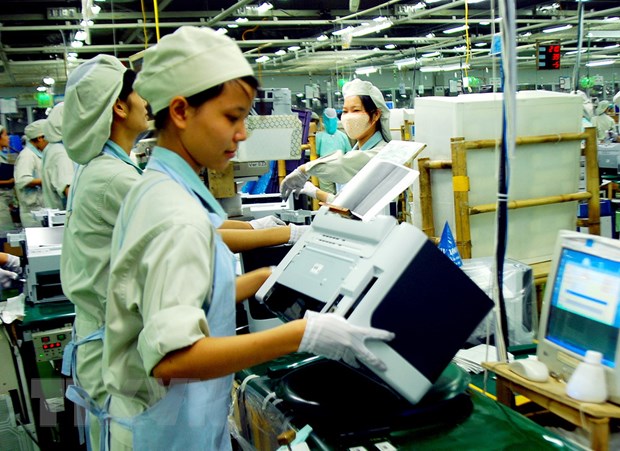 Economy
Economy


|
| Wokers at Samsung Vietnam in nothern province of Bắc Ninh's Yên Phong Industrial Park. Samsung Vietnam has ensured the dual goal of ensuring the health and safety of all employees while maintaining production stability and export targets. — VNA/VNS Photo Thái Hùng |
HÀ NỘI — Eighty per cent of enterprises had maintained their business to the end of the third quarter of 2020 despite the second wave of COVID-19, though many had to implement salary reductions.
Vũ Tiến Lộc, chairman of Việt Nam Chamber of Commerce and Industry (VCCI) made the statement at a forum held in Hà Nội on Thursday.
“At the end of the first quarter of 2020, when the first wave of the pandemic appeared in Việt Nam, a lot of businesses struggled, facing many difficulties and many feared that they could not sustain," Lộc said.
However, according to the VCCI’s latest survey, by the end of the third quarter, up to 80 per cent of businesses still maintained operations and ensured jobs and income for employees. Most businesses did not lay off workers and instead rescheduled or reduced working hours and wages. The businesses received support from employees to help fight the pandemic.
He said many enterprises have turned “risks into opportunities” as garment and textile enterprises switched to making masks for export while some produced medical supplies and equipment.
“In human history, we have not ever seen the world change so significantly and quickly like this. Society is constantly changing, requiring Government, economy, and enterprise to be resilient and constantly mobilise and innovate to keep up with the speed and to develop sustainably,” the chairman added.
“It was in the historic challenge of the COVID-19 pandemic that the internationally recognised Viet Nam rapidly took an effective response. We have the opportunity to witness the persistent ability to maintain jobs for employees, strong recovery and restructuring efforts of enterprises to overcome the crisis, together with solidarity, support, sharing and understanding among the entire political system, government, businesses, organisations and individuals in the community to join hands to fight off the pandemic.”
Ngọ Duy Hiểu, Vice Chairman of the Việt Nam General Confederation of Labour, said COVID-19 had affected about 7.8 million workers who had to resign, quit their jobs, stop working, postpone labour contracts or leave unpaid jobs. Many workers and a portion of non-public teachers whose incomes are not high have been affected by the pandemic.
“Trade unions at all levels actively participate with the political system and the employer in protecting the health and lives of labourers; take care and protect the interests of employees, encourage employees together to overcome difficulties, implement 'dual goals', to have sustainable jobs and stable income, help businesses stay firm after COVID-19,” he said.
Choi Joo Ho, President of Samsung Vietnam, said the pandemic had caused negative impacts on Việt Nam, businesses all over the world and Samsung Vietnam was no exception. However, amid the pandemic, in addition to maintaining welfare regimes and striving to protect the health and safety of employees and local communities, Samsung has always made sure no employees will lose their jobs and take unpaid leave.
“Samsung Vietnam will continue its efforts to implement regulations and measures to prevent epidemics of Vietnamese Government as well as Samsung Group to achieve the dual goal of ensuring the health and safety of all employees while maintaining production stability and export targets,” he added.
The Samsung Vietnam Multilateral Forum is an initiative of the Samsung Vietnam Consortium, which has been held annually in Vietnam since 2018, to connect the knowledge, enthusiasm, resources, and energy of all stakeholders, including policymakers, non-governmental organisations, social organisations, experts, researchers, and businesses. — VNS